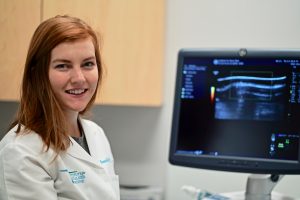Neenah Grade, PA-C
Physician Assistant. Specializing in pediatric rheumatology.
 Neenah Grade is a board certified Physician Assistant with a background in primary care and integrative pain medicine. She received a Bachelor’s degree in genetics, cell and molecular biology from Arizona State University before completing her Masters in Science at Arcadia University in Philadelphia.
Neenah Grade is a board certified Physician Assistant with a background in primary care and integrative pain medicine. She received a Bachelor’s degree in genetics, cell and molecular biology from Arizona State University before completing her Masters in Science at Arcadia University in Philadelphia.
She is highly experienced in small to large joint injections using ultrasound for guidance. She uses both traditional and newer treatment methods to help patients reach their health goals, and will work with each patient individually to achieve this.
With Neenah bringing her pediatric rheumatology expertise to IFSMED, she and Dr. Shikhman developed protocols specific to pediatric infectious and autoimmune conditions. Neenah is also responsible for the concierge primary care program at IFSMED.
These pediatric conditions include:
- Autoimmune thyroid conditions
- Celiac disease and gluten sensitivity
- Lyme disease and co-infections
- Pediatric Autoimmune Neuropsychiatric Disorders Associated with Streptococcal Infections (PANDAS)/ Pediatric Acute-onset Neuropsychiatric Syndrome (PANS)
- Parasite and other gut bacterial infections
- Pediatric inflammatory joint pain
- Systemic lupus erythematosus
Having a special interest in treating Lyme disease in children; she trained with a world leading pediatric Lyme disease specialist, Dr. Charles Jones. She is our resident expert when looking for a children’s Lyme disease specialist in San Diego.
“In order for a patient to focus on improving their health they have to feel comfortable with their provider and I hope to foster that relationship. I will work closely with Dr. Shikhman and the rest of the staff to make sure you are getting your best care at our office.”
Dr. Shikhman and Neenah, in conjunction with The University of Wisconsin-Madison and Galaxy Diagnostics, publish article in Microbiology Spectrum: Antibodies to Borrelia burgdorferi and Bartonella species in serum and synovial fluid from people with rheumatic diseases.
The results of the study suggest that synovial fluid could be a useful sample for the clinical diagnosis of Lyme disease. Data shows that antibodies to B. burgdorferi, but not Bartonella spp., are more commonly found in synovial fluid than serum of patients with joint effusion. Since Lyme arthritis is a common—and sometimes difficult to diagnose—rheumatic disease, improving diagnostic capabilities is of utmost importance.